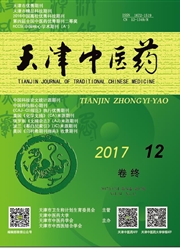

 中文摘要:
中文摘要:
【目的】建立并验证“肝气郁结证”大鼠模型,在此基础上研究“肝气郁结证”下丘脑一垂体一肾上腺(HPA)轴相关激素的改变。[方法】20只Wistar大鼠随机分为对照组、模型组。采用慢性应激+孤养方法制备“肝气郁结证”大鼠模型,通过行为学观察、蔗糖水偏嗜实验、开野实验评价模型。运用酶联免疫吸附试验(ELISA)技术对两组大鼠血清进行HPA轴相关激素分析。【结果】肝气郁结模型大鼠表现为躲避、活动减少、大便松散、皮色失去光泽,造模第2周开始生长较对照组缓慢,摄食量减少(P〈0.05);28d造模后,水平得分、垂直得分较正常组均明显降低(P〈0.01,P〈0.05),血清皮质酮(CORT)、促肾上腺皮质激素释放激素(CRH)的含量明显升高(p〈0.01)。[结论】从病因学、行为学和症状表现上成功构建了肝郁证大鼠模型,并进一步证实模型大鼠呈HPA轴亢进状态,有助于阐释肝郁证病理改变的本质。
 英文摘要:
英文摘要:
[Objective] To establish and validate the syndrome of stagnation of liver Qi model in rats. The change of hormones related to hypothalamus-pituitary-adrenal (HPA) axis was investigated. [Methods] Twenty rats were randomly divided into two groups: control group and model group. We adopted the method of chronic stress combining with isolated breeding to prepare the model in rats with the stagnation of liver-Qi syndrome. Open-Field test and partial addicted to sugar water test were carried out one the day before experiments and after experiments. The rat' s body weight and food intake in 24 h were recorded on the day before experiments, and on the 4th , 8th, 12th, 16th, 20th, 24th and 28th day during experiments respectively. The content of adrenocorticotropic hormone-releasing hormone (CRH) and serum corticosterone (CORT) were measured by ELISA method. [Results] There were some appearance of abnormal behaviors, such as decrease of elusion, slackness, looser stools, and matte fur among model rats. After two weeks the body weight of model group was significantly lower than that of control group (P〈0.05). After chronic stress procedure for 4 weeks, both horizontal movement scores and vertical movement scores of rats in model group were significantly reduced compared with the normal group (P〈0.01). Sugar consumption, the degree of partial addicted to sugar water and food intake of model group rats decreased significantly (P〈0.01). The serum contents of CRH and CORT in model group rats were significantly higher compared with the control group (P〈0.01). [Conclusion] Based on the etiological, behavioral and pathological observation, it can be concluded that the rat model of syndrome of stagnation of liver Qi was successfully established by the method of chronic stress combining with isolated feeding. The rats with stagnation of liver-Qi syndrome shows a state of hyperactivity of HPA axis, which can help to explain the essence of its pathologic changes.
 同期刊论文项目
同期刊论文项目
 同项目期刊论文
同项目期刊论文
 期刊信息
期刊信息
